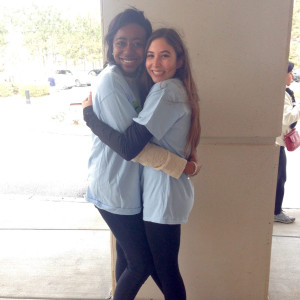(Written by Zaria Hampton)
This is my third or fourth time writing this story. It’s a long one, and to y’all, the audience, that may sound very exhausting. It takes a lot of processing to share a story that is really close to your heart. It especially takes a lot when that story reflects your experiences with a mental health disorder.
You want to make sure to include every detail just so that people get the full idea. You want to be graphic so that people take you seriously, but you want to be funny so that people know that you made it out okay. You want to be rather vague so that you don’t run the risk of hurting others, but you want to be very clear so that you don’t run the risk of others hurting themselves. The list goes on and on of things to be worried about when sharing a testimony, but now I am on my fourth draft, and I see what this story is about.
It’s not about what I was doing at the darkest points in my eating disorder. It’s not about what outside forces may have brought me to certain struggles. It’s about the single constant throughout the entire story. That constant is myself, and through every struggle, every success, every high point, every low point, I was present.
While I saw every side to my disease, this story is about how I have now seen every side to my recovery.
My parents could not have picked a better area to raise their only child. There isn’t an easier city to live in than Sugar Hill, GA.
Apparently, it wasn’t easy enough because they divorced when I was pretty young.
I don’t remember much from my parent’s marriage. I remember the yelling, and I think that’s it. I don’t know if they loved each other, but that’s okay. Individually, they loved me with their full hearts.
I loved school like most “smart kids” did. At the time, it was a place where I could fully express my creativity and receive praise for it. Teachers liked me a lot. That was nice. I was really different though. I didn’t know why. I now see that all kids are different, why certain ones get picked on I will never know.
It sucked to get made fun of, but you know, cool things came out of it. I learned to be incredibly independent. I learned to love problem solving and figuring out the best moves for myself. Middle school happened the way it always happens. When high school came, I loved it even more than elementary school. I actually found friends who were more concerned with my personality instead of things that did not matter.
I can say with my whole heart that I made the best friends I ever could in high school. Everything was perfectly lined up for my success. Nothing was that “hard” until the end of my junior year. I had different triggers in high school that began to really, really affect me.
A lot of people often ask me, “What puts people at risk for addiction? Are there single causes for them?” From experience, I have learned, and while I don’t speak for disease and I don’t speak for everyone with them, but from what I have experienced, I have come to this. Almost everyone experiences really difficult problems within their lifetime.
Whatever or whoever they resort to in this time of struggle, is their coping mechanism. Everyone has different coping mechanisms, and some can be more addicting than others. How his or her brain responds to this, is out of anyone’s control, and there is no one to blame.
We cannot control where it comes from, but we can control how long we let it affect us.
In the beginning stages of my eating disorder, I began to gain some weight. Honestly, who cares? I was still healthy. Physically healthy, at least. People started to notice, and as people love to do, they commented. The funny thing about outside commentary is that most of the time you are already aware of what people are “bringing to your attention.”
Anyway. A few of my friends had started using MyFitnessPal. I decided to download it out of curiosity. I was not at all concerned with changing my diet; I was just interested in how my daily caloric intake lined up with some advice on a free app. MyFitnessPal was never pleased. Though it was just an app, I felt like every time I entered a meal into it, I was disappointing it. I was letting it down.
I then became really terrified of messing up, and eating more than the voice in my head, “Ed,” was telling me to. The app became the least of my worries. Within your eating disorder, there are two personalities. One side of you is the old you. That side loves her friends, loves learning, and loves living. The other side loves lying, hates the world’s offerings, and is okay with dying. I remember telling myself that I rather be sick and thin than happy and not losing weight.
two personalities. One side of you is the old you. That side loves her friends, loves learning, and loves living. The other side loves lying, hates the world’s offerings, and is okay with dying. I remember telling myself that I rather be sick and thin than happy and not losing weight.
For those who think like this, why do you think like this? Don’t shame yourself for feeling this way. Shame the disease for filling you with these lies. Sometimes it’s hard because you KNOW these thoughts are unhealthy, and the old you would give anything not to feel this way. Stop hating yourself for feeling this way and understand that there is life after having these feelings.
To those who don’t think in this way. Understand that it is okay not to understand. Recognize there is an issue within this, but realize there are solutions. I started college at the University of Georgia in August of 2014. Everything was brand new. Some friends invited me to a church in Athens, so I decided why not. It was cool, fun, and happy. You know, all of those fun church things. Going to church was as alright as my depression allowed it to be.
I was overwhelmed with depressing and suicidal thoughts.
Fortunately, old me gained enough strength to seek out therapy. When I say, I worked hard to get better I mean it. I spent months in therapy before I considered medication. I was terrified of it. Most of us have heard people say, “I don’t want to try meds because I don’t want them to change me.” That is completely fair. I said the same thing, but I knew I was not getting better. So yeah, the doctor wrote a prescription for Prozac, and it was awful. But just like with physical illnesses, sometimes the first medication doesn’t work.
Then, we tried Celexa. I took it responsibly, and life really started to look and feel different. The medicine didn’t make me happy. It got me to a state of normality, so that I could have an equal chance at happiness like the next person. That’s all I really desired.
I tried to become more active around campus. I even found a group for people struggling with eating disorders. Things were looking up. My life was in the better part of the cycle. Sometimes thinking the cycle has been broken is a part of the cycle. I was pretty deep into the cycle. For example, for Eating Disorder Awareness Week, I finally became public about my eating disorder.
I was proud to be open and to let everyone of Instagram know things were great. Not even two weeks later, I back into the darkest season of my eating disorder. My life was out of control. On the outside, I was bright. I was happy because I had schedules that I could stick to. I could journal my food again, except no one was watching how often I was using my meal plan. No one was actually paying attention to how long I was at the gym.
Physically, I was great. Mentally, I was falling apart.
I was in a state of punishing myself for things that “normal” people did effortlessly. In the beginning, it was something I hid because I liked it. As it progressed, I no longer liked it because I no longer could like myself. It became something I hid because I was ashamed.
My shame arose from the stigmas surrounding eating disorders. Eating disorders are awful things. However, sometimes society confuses viewing the diseases as terrible things with viewing the people who struggle with them as terrible people. It’s never okay to use terms like anorexic and bulimic to describe someone’s appearance. Imagine the looks if you said someone looked diabetic.
By perpetuating this stereotype that all people with eating disorders look the same, you alienate the group of people with eating disorders who don’t look that way -sometimes making it worse. Disordered eating is also not something you try. Do you try to have psychosis? Of course not. So why is our language so careless? These comments come together to create a web of lies that hurt our community instead of encouraging it.
This year I joined Active Minds which is an organization centered on raising mental health awareness and changing the stigmas associated with the illnesses. We have talked a lot about the reasons we speak up about these things. I speak because just as I should not be ashamed to say I had an eating disorder, I should not be ashamed to say how I got better.
For six months I was seeing a therapist, a psychiatrist, a dietician, and a physician. Each of them helped me tremendously in learning about myself and the disease. There were a lot of triggers to my disease that I really needed to think through. I am thankful for them. That being said, I stopped seeing all of them last summer.
My new outreaches were to my family, friends, and the Lord.
My healing came spiritually. As I began my sophomore year of school, I began to devote more of time and heart to my relationship with the Lord. I began to learn who He truly is and who I am to Him. I found true recovery when I realized my true identity and potential.
Recovery is hard because sometimes you don’t want to get better. Once I realized who I was and what I deserved, I desired recovery. My behaviors have slowly dwindled away. The mental games Ed likes to play still remain and may for a while. I am the most active I have ever been, and I have the relationships I was searching for at my lowest lows.
I know there are several other testimonies of how others overcame their disease. I speak because there is beauty in every form of recovery. There are people who are unhealthy who are being told by their peers, by the media, and by their minds, that their struggles are forever and that there is no hope. It is a lie. I speak because getting help is more important than the stigma that comes with it.
An open invitation of recovery to those who are struggling: You are not your disease. The harsh thoughts that overwhelm you do not come from yourself. They come from the illness. There is life after this tribulation. There is a joy within recovery, that can’t be felt outside of it. You are worthy of help.
Do not hate yourself. Hate the disease. Though life feels out of control, you are not. What do you gain from your disease that recovery may take away? More importantly, what will you gain from recovery, that your disease takes away?

 two personalities. One side of you is the old you. That side loves her friends, loves learning, and loves living. The other side loves lying, hates the world’s offerings, and is okay with dying. I remember telling myself that I rather be sick and thin than happy and not losing weight.
two personalities. One side of you is the old you. That side loves her friends, loves learning, and loves living. The other side loves lying, hates the world’s offerings, and is okay with dying. I remember telling myself that I rather be sick and thin than happy and not losing weight. 

